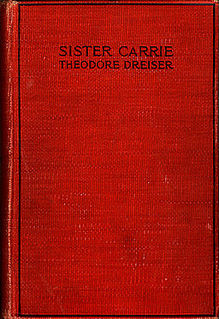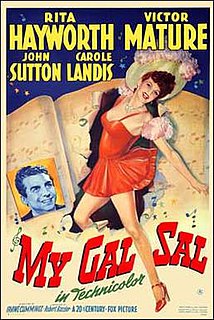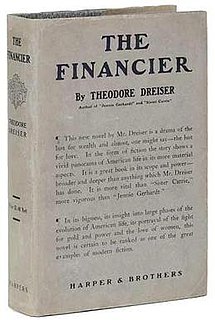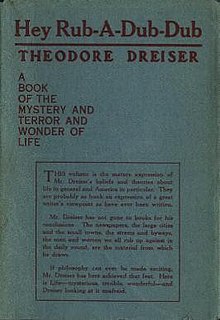 First edition | |
| Author | Theodore Dreiser |
|---|---|
| Country | United States |
| Language | English |
| Genre | autobiography |
| Publisher | University of Pennsylvania Press |
Publication date | 1983 |
An Amateur Laborer is an autobiographical book by Theodore Dreiser.
 First edition | |
| Author | Theodore Dreiser |
|---|---|
| Country | United States |
| Language | English |
| Genre | autobiography |
| Publisher | University of Pennsylvania Press |
Publication date | 1983 |
An Amateur Laborer is an autobiographical book by Theodore Dreiser.
Although started in 1904, it was only published posthumously in 1983. [1]
The book is an autobiographical account of a three-year struggle with neurasthenia [1] in the aftermath of Sister Carrie 's financial failure. [2] After being constantly turned down for publications while living in Brooklyn, Dreiser finds a job as a manual worker on a railroad. [2] Eventually, his brother Paul Dresser sends him to a health resort, leading to his replenished morale. [2]

Theodore Herman Albert Dreiser was an American novelist and journalist of the naturalist school. His novels often featured main characters who succeeded at their objectives despite a lack of a firm moral code, and literary situations that more closely resemble studies of nature than tales of choice and agency. Dreiser's best known novels include Sister Carrie (1900) and An American Tragedy (1925).

Sister Carrie (1900) is a novel by Theodore Dreiser about a young country girl who moves to the big city where she starts realizing her own American Dream, first as a mistress to men that she perceives as superior, and later becoming a famous actress. It has been called the "greatest of all American urban novels".

An American Tragedy is a novel by American writer Theodore Dreiser, published at the end of 1925. He began the manuscript in the summer of 1920, but a year later abandoned most of that text. In 1923 Dreiser returned to the project, and with the help of his wife Helen and two editor-secretaries, Louise Campbell and Sally Kusell, he completed the massive novel in 1925.

The Titan is a novel by Theodore Dreiser, completed in 1914 as a sequel to his 1912 novel The Financier. Both books were originally a single manuscript, but the narrative's length required splitting it into two separate novels. Dreiser's manuscript of The Titan was rejected by Harper & Brothers, publisher of The Financier, due to its uncompromising realism; John Lane published the book in 1914. The Titan is the second part of Dreiser's Trilogy of Desire, a saga of ruthless businessman Frank Cowperwood. The third part of the trilogy, The Stoic, was Dreiser's final novel, published in 1947 after his death.
The American Spectator was a monthly literary magazine which made its first monthly appearance in November 1932. It was edited by George Jean Nathan, though Eugene O'Neill, Ernest Boyd, Theodore Dreiser, and James Branch Cabell were also listed as joint editors. The original editors left the publication in 1935, after which the paper continued monthly publication under new editors until October 1936. The American Spectator lasted another six months on a bimonthly before folding altogether.

My Gal Sal is a 1942 20th Century Fox musical starring Rita Hayworth and Victor Mature. The film is a biopic of 1890s composer and songwriter Paul Dresser and singer Sally Elliot. It was based on a biographical essay, sometimes erroneously referred to as a book, by Dresser's younger brother, novelist Theodore Dreiser. Some of the songs portrayed as Dresser's work were actually written by him, but several were created for the film by the Hollywood songwriting team of Ralph Grainger and Leo Robin.

The Stoic is a novel by Theodore Dreiser, written in 1945 and first published in 1947. It is the conclusion of his Trilogy of Desire, which includes The Financier (1912) and The Titan (1914). This series of novels depicts Frank Cowperwood, a businessman based on the real-life streetcar tycoon Charles Yerkes. Dreiser had attempted to complete his trilogy in the early 1930s, but he was unable to begin The Stoic until near the end of his life; he died before he could finish the manuscript, and his widow Helen assembled the novel's final pages.

The Financier is a novel by Theodore Dreiser, based on real-life streetcar tycoon Charles Yerkes. Dreiser started writing his manuscript in 1911, and the following year published the first part of his lengthy work as The Financier. The second part appeared in 1914 as The Titan; the third volume of his Trilogy of Desire was also Dreiser's final novel, The Stoic (1947).
"Old Rogaum and His Theresa" is a short story written by Theodore Dreiser. It was originally published in Reedy's Mirror on December 12, 1901 under the title of "Butcher Rogaum's Door." It subsequently appeared in the 1918 volume Free and Other Stories. With this short story, Dreiser begins to move from allegory to realism dealing with issues including sexual behavior, city life, immigrant struggles, and the conflicts between children and their parents.

Jennie Gerhardt is a 1911 novel by Theodore Dreiser.

The Bulwark is a 1946 (posthumous) novel by Theodore Dreiser.

Harris Merton Lyon (1882–1916) was an American short story writer.

Hey Rub-a-Dub-Dub: A Book of the Mystery and Wonder and Terror of Life is a collection of twenty essays by Theodore Dreiser.
Thelma Somerville Cudlipp was an American artist and book illustrator.

The "Genius" is a semi-autobiographical novel by Theodore Dreiser, first published in 1915. The story concerns Eugene Witla, a talented painter of strong sexual desires who grapples with his commitment to his art and the force of his erotic needs. The book sold 8,000 copies in the months immediately following publication but encountered legal difficulties when it was declared potentially obscene. Dreiser's publisher was nervous about continuing publication and recalled the book from bookstores, and the novel did not receive broad distribution until 1923. When The "Genius" was reissued by a different publisher, the firm of Horace Liveright, it immediately sold more than 40,000 copies.

An American Tragedy is an opera in two acts composed by Tobias Picker, with a libretto by Gene Scheer. This was Picker's fourth opera, written four years after the debut of Thérèse Raquin. Based on the Theodore Dreiser novel, An American Tragedy, the opera was commissioned by the Metropolitan Opera, and premiered in New York City on December 2, 2005.

"Solar Sister" is a song by the American alternative rock band The Posies, released as the second single released from its album Frosting on the Beater in 1993.
American Tragedy may refer to:

Horses and Men is a 1923 short story collection by the American author Sherwood Anderson. It was Anderson's fourth book to be published by B.W. Huebsch and his third collection after the successful short story cycle Winesburg, Ohio. The book was dedicated to writer Theodore Dreiser and included a two-page essay about him titled "Dreiser" in addition to a Forward and nine stories.

Jennie Gerhardt is a 1933 American pre-Code drama film directed by Marion Gering for Paramount Pictures. It stars Sylvia Sidney, Mary Astor, and Edward Arnold. The film is based on the 1911 novel Jennie Gerhardt by Theodore Dreiser.
| This article about a biographical or autobiographical book whose subject was born in the United States is a stub. You can help Wikipedia by expanding it. |